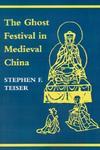
Book Summary
Even a brief experience of the ghost festival leaves an impression of spirited diversity. My own encounter with the annual celebration began in Taiwan on September 5, 1979, when string after string of firecrackers punctuated an already fitful night of sleep. All month long hungry ghosts had been wandering the earth, released from their usual torments in the dark regions of hell to visit their families, who welcomed their own kin but warded off stranger ghosts with noisemakers and smoke. Largely unstudied until now, the religious festivals that attracted Chinese people from all walks of life provide the most instructive examples of the interaction between Chinese forms of social life and the Indian tradition of Buddhism. Stephen Teiser examines one of the most important of such annual celebrations. He provides a comprehensive interpretation of the festivities of the seventh lunar month, in which laypeople presented offerings to Buddhist monks to gain salvation for their ancestors. Teiser uncovers a wide range of sources, many translated or analyzed for the first time in any language, to demonstrate how the symbolism, rituals, and mythology of the ghost festival pervaded the social landscape of medieval China.
Book Details
| Book Name | The Ghost Festival In Medieval China |
| Author | Stephen F. Teiser |
| Publisher | Princeton University Press (Nov 1996) |
| ISBN | 9780691026770 |
| Pages | 296 |
| Language | English |
| Price | 2843 |








